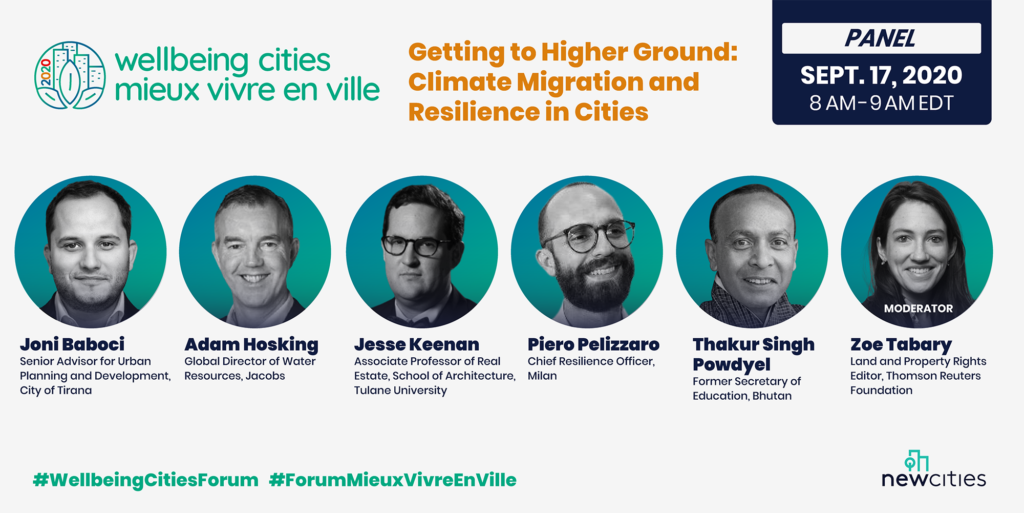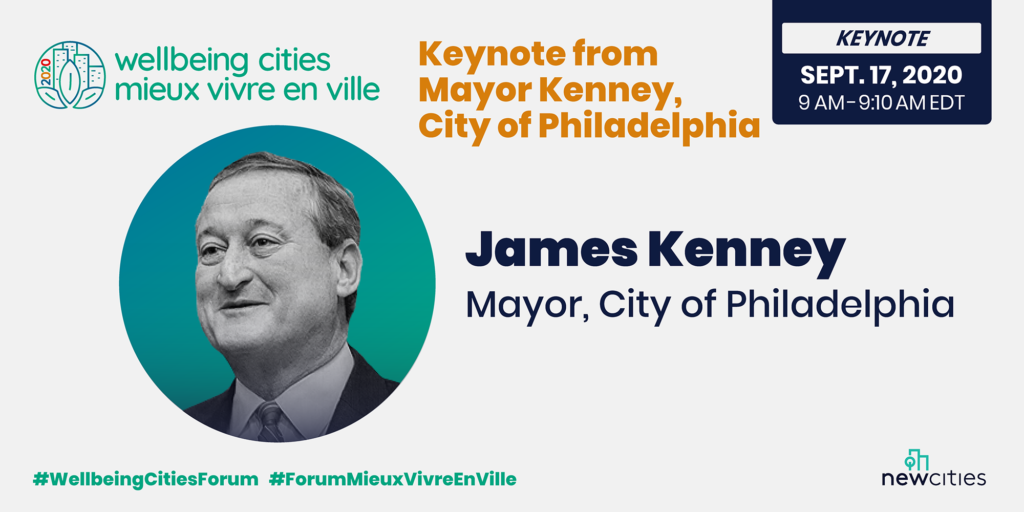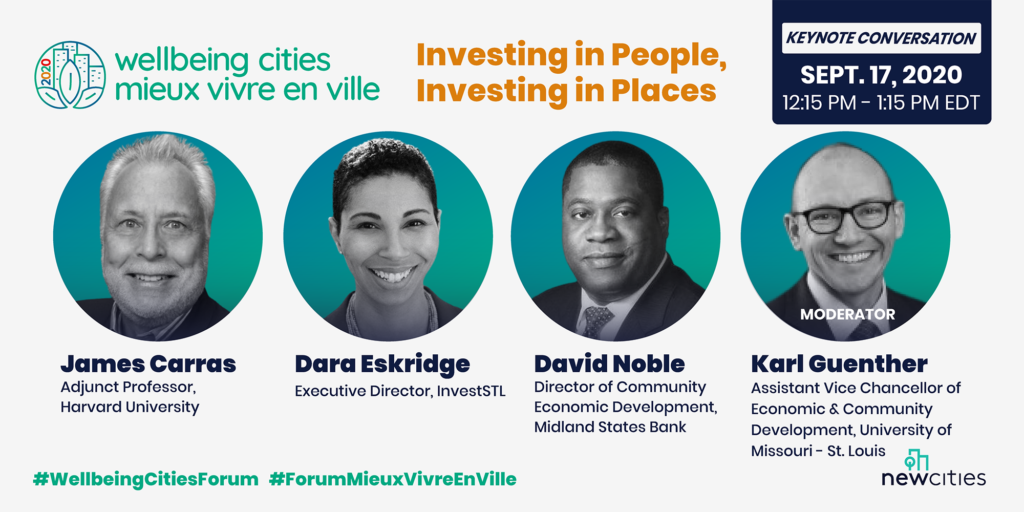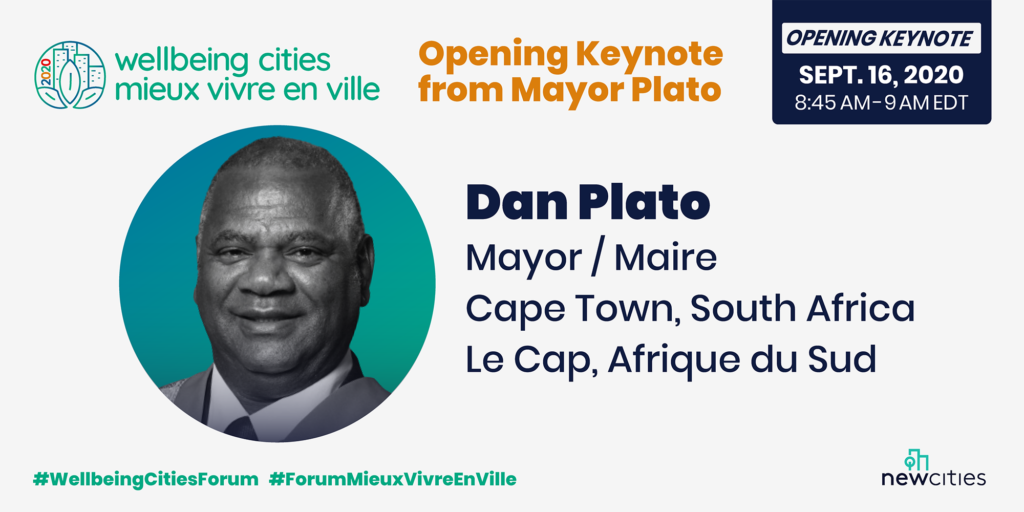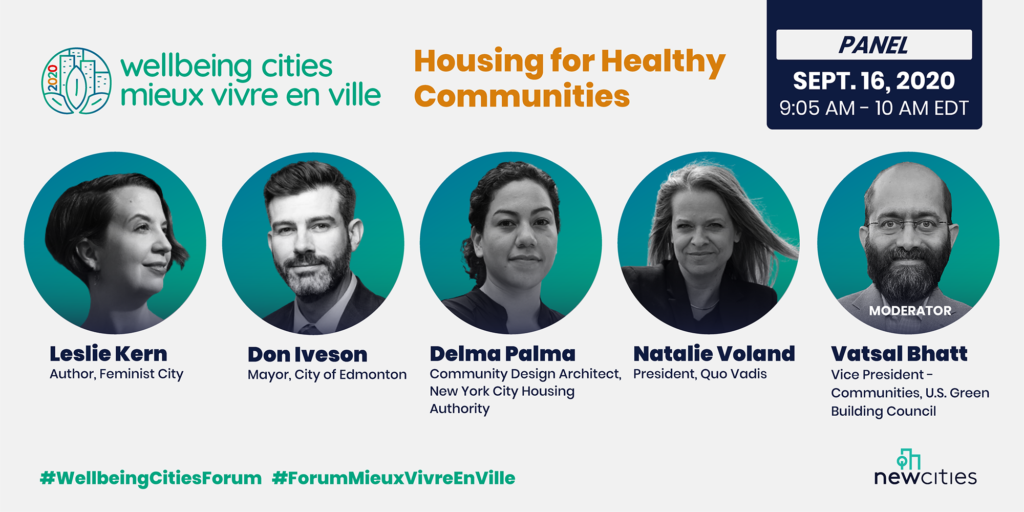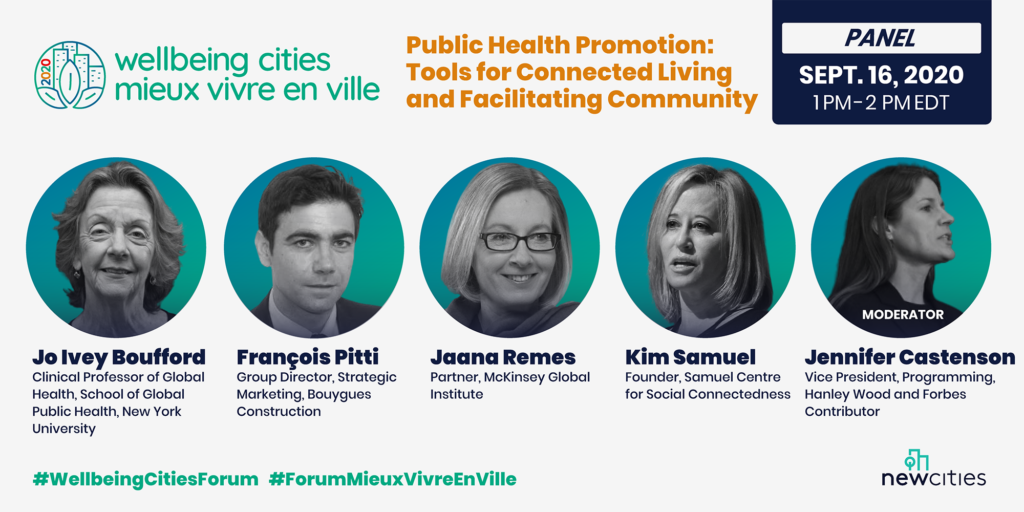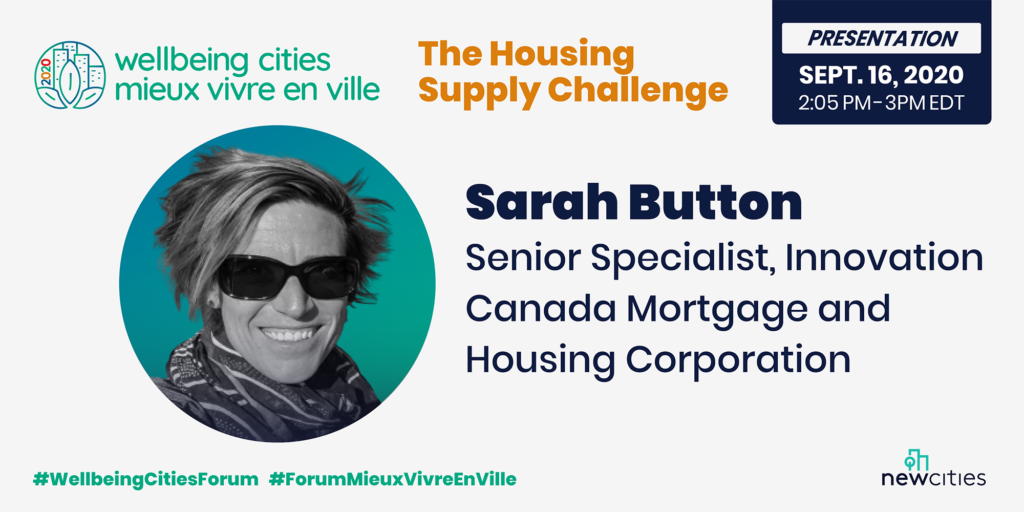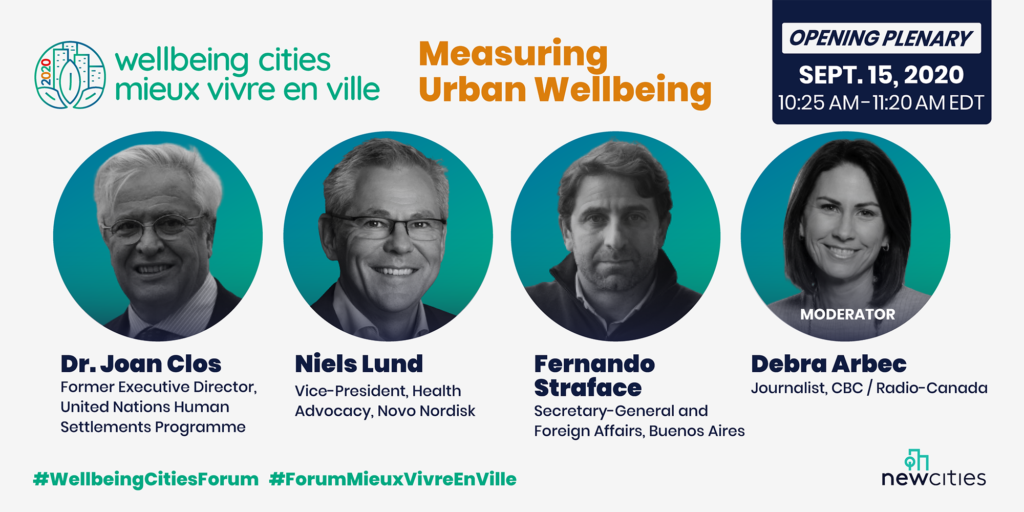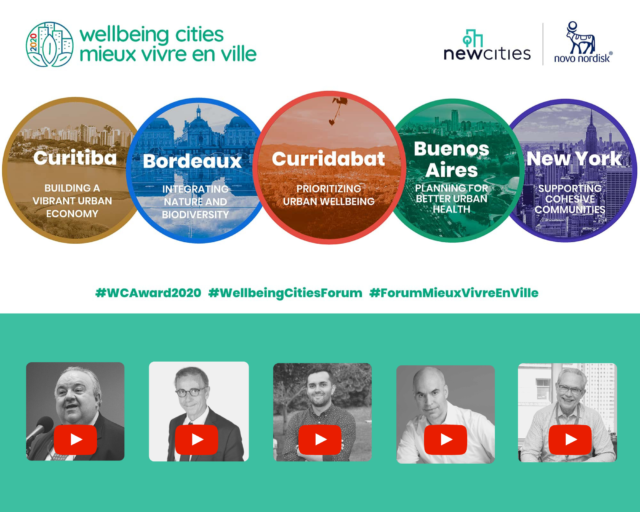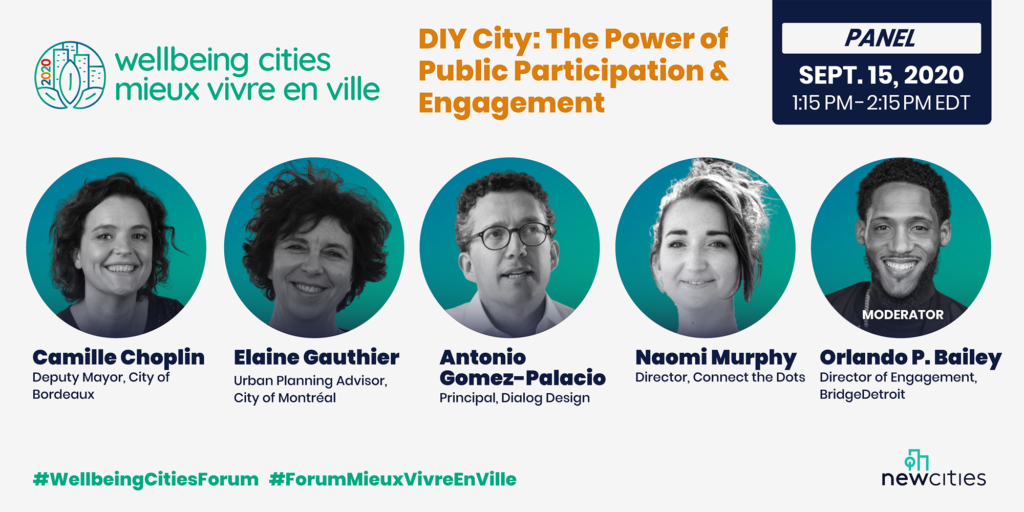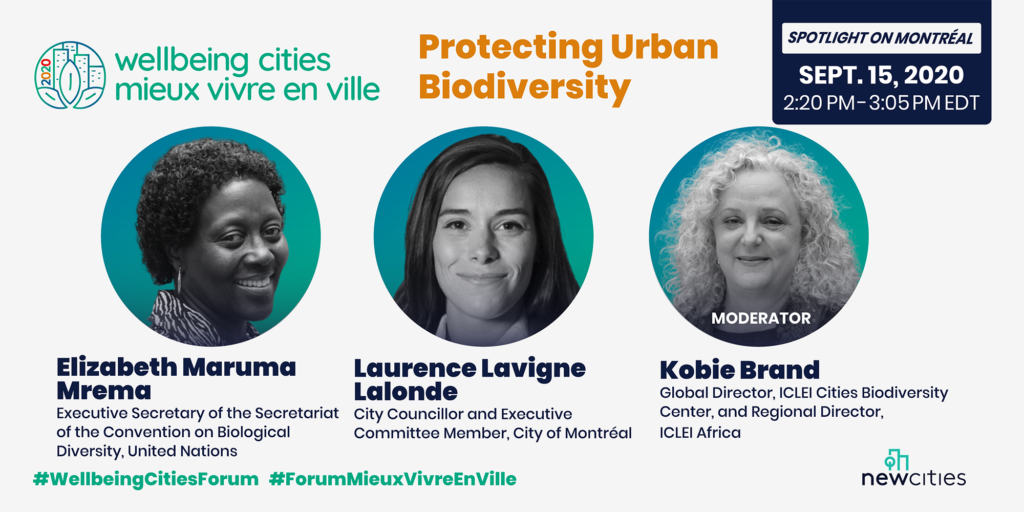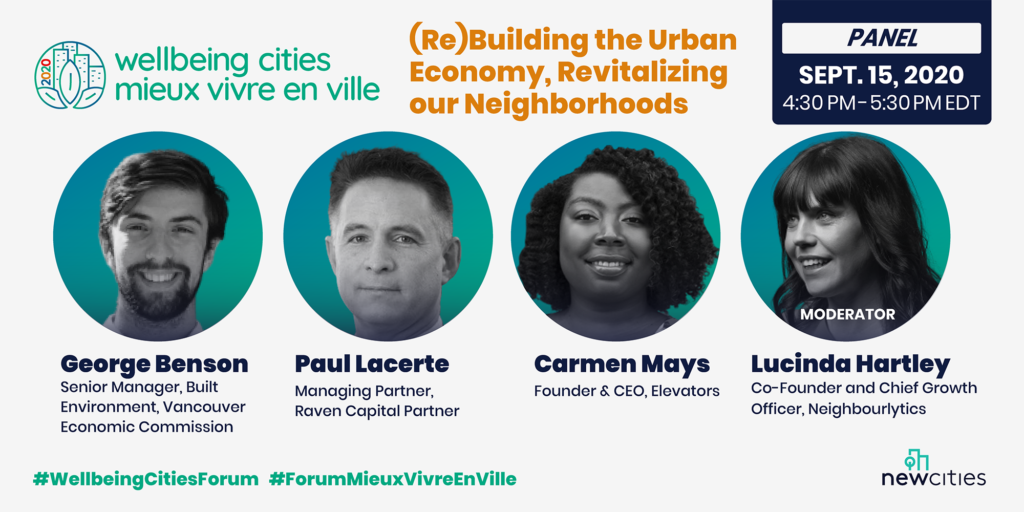
Wellbeing Cities 2020 HIGHLIGHTS
septembre 15, 2020 — Événements, Programmes
Day 3 – September 17
Follow our Twitter Moments.
Last but not least, Day 3 was loaded with engaging speakers, fruitful conversations, and forward-looking solutions. Scroll down for the key takeaways and replays!
Trending Topics:
#HigherGround
#ClimateMigration
#Mobility
#Sustainability
#Collaboration
#CommunityInvestment
Opening Panel – Getting to Higher Ground: Climate Migration and Resilience in Cities
“Getting to Higher Ground” dove deep into a conversation on equitable and human-centered climate migration principles. Panelists weighed in on the social, economic, cultural, and ethical dimensions of managed retreats, as they pondered the question, “why do humans even congregate in the first place?”
- Managed retreats should be human-focused. Engage communities in the process. What’s best for them? Intentionality and the ability to listen will go a long way to create population resilience long-term. Look at the issue in the context of wellbeing; this is an opportunity to reorder and transform society.
- City resilience strategies must be based on resident participation. Education is an essential instrument. Populations should be made aware of the risks with the use of the latest science. We must focus on what is certain: sea level is rising, extreme weather events are becoming more intense and frequent.
- Ensure climate migration is as ethical as possible, not to replicate societal inequalities. People’s capacity to move must be factored into the decision-making process, given much of this migration is internal. Urban planners need to use measurements such as quality of life, and level of wellbeing to capture the full picture of displacement.
- Flexibility is key. City urban planning and sustainability strategies must remain nimble and adaptable. This must be reflected in its housing strategy as well as its infrastructure and civil institution planning. A community’s welcoming capacity for new immigrants must also be considered.
Keynote Mayor Kenney, City of Philadelphia
Mayor James Kenney, City of Philadelphia, took the virtual stage this morning to share the city’s wellbeing efforts. Philadelphia’s Housing First program was a 2020 Wellbeing Cities Award finalist.
Workshops
- Do You Listen to Your City? Turn Urban Sounds into Information & Actionable Insights
By SecuraXis - New Social Environments for Prevention & Health Promotion
By Novo Nordisk
Panel #2 – Co-Constructing an Equitable Mobility Future
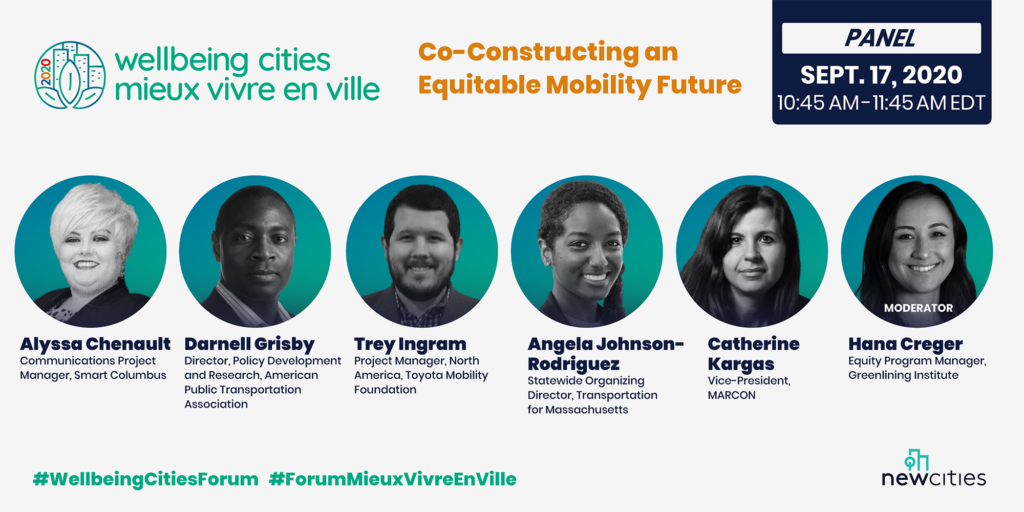
A well-animated panel on inclusive transportation systems, highlighted as an essential component to thrive in the urban realm. The discussion examined mobility and access from a wellbeing and equity perspective. Here are some touchpoints:
- Equitable mobility means providing access that didn’t exist before. This includes micro-transit, on-demand transportation for people with diverse abilities and serving lower-density areas. Respecting everyone’s individual needs.
- Technology enables access to underserved neighborhoods.
- The road system is skewed towards personal vehicles. How can we change public transit to be more inclusive and not fall 2nd class to cars? Solutions to shift people onto public transportation included dedicated bus lanes and a congestion pricing system to benefit and incentivize public transit riders.
- Equity should not just be a practice, it should be a commitment. We must hold ourselves accountable, and strive for continual improvement on a personal as well as professional level.
Keynote Conversation: Investing in People, Investing in Places
Fantastic closing keynote discussion on equitable neighborhood development, how its evolving and where panelists would like to see it in the future. Here are our takeaways:
- Funders need to start seeing process as product. There is a funding gap in projects deemed: advocacy, planning, and process types because funders traditionally look for returns. Philanthropic investing is usually based on hitting metrics. Adopting an equitable investing framework is still not widely used.
- All ecosystem players must pull together to best leverage capital. Collaboration is the only way to leverage enough capital to make change that goes beyond topical fixes. First, get everyone around the table and commit to a guiding framework. This also involves coalition building. It can be difficult to rally financial institutions as they have always been competitive in nature.
- Multigenerational change and community evolvement require intentional investment. We must change our frame of mind when it comes to investing in disadvantaged communities; we are investing because it is owed to these communities. In many cases, we need to re-educate donors and philanthropists in order to achieve transformational change in neighborhoods, and drive long term sustainability. This also requires policy reform, incorporation of local residents, and rethinking who we give our dollars too.
Thank you to our experts and everyone who attended. We hope to see you for our 2021 edition!
Day 2 – September 16
Discussions on the second day of the Forum were centered on Housing & Public Health. Scroll down for the key takeaways and replays!
Trending Topics:
#Housing
#Equity
#BusinessModels
#Telehealth
#Homelessness
#ParticipatoryDemocracy
#PublicHealth
Opening Keynote with Dan Plato, Mayor of Cape Town
Day two of the Forum opened with remarks by Mayor Dan Plato of Cape Town, South Africa. Mr. Plato addressed the key urban challenges facing the city, and provided an overview of progress on wellbeing.
He invites other mayors to share best practices.
Also, endorse the Declaration of Montreal introduced by Mayor Plante to join the wellbeing movement.
Panel #1 – Panel: Housing for Healthy Communities
The panel hosted a diverse range of voices, representing the private sector, academia, community organizations, and city mayors to rethink the intersection of Health and Housing. We took some notes for you:
- The public health crisis allows us to look at Housing through an equity and health lens. The built environment does not provide equally for women and children, elders, and minority groups, arising from years of disinvestment and inequality in the way cities are planned and built. Economic recovery should be connected to housing models that support care, employment opportunities, and sustainable transportation within the community.
- Government spending on Housing is an investment, not only an expenditure. Investing in Housing is a smart economic investment. Fiscal policy reform will post a long-run return on investment and immediate benefits for people.
- Green, energy-smart buildings support a long-term sustainability plan. The current landscape enables retrofitting over building new, which is also cheaper. We need a regulatory framework to assist the energy transition and financing tools to push those incentives. Carbon smart buildings are good for the environment and public health. Fiscal incentives should reflect that.
- The business community is needed to deliver affordable housing. We need to make a business case for the real estate community to invest in affordable and equitable housing. They need incentives beyond just legislation.
Workshops
- Facilitating Digital Negotiations for Planning Interventions in Public Space
By Geodesignhub - Everyday More Alive: Elevating Human Connectivity & Creativity to Create Vibrant Urban Ecosystems
By Moment Factory
Keynote: Care and Living in Community in Brussels, Belgium
Hear from Nawel Ben Hamou, Secretary of State of the Brussels Capital Region, to present CALICO, the Care and Living in Community, co-housing community led project—one of our Wellbeing Cities Award finalists!
Panel #2 – Public Health Promotion: Tools for Connected Living and Facilitating Community
A fast-paced panel on technology, collaboration, and social connection. Here is the rundown:
- The health sector has been quick to adapt, and quick to adopt new technologies in response to the global health crisis. It took the catalyst of an emergency situation to bring digital technologies to the forefront, long stuck behind regulatory, financial and legal obstacles. These include: telemedicine, telehealth, and contact tracing, among others.
- Public health is finally in the forefront of many city conversations. The words “urban” and “health” are often seen together, a new occurrence for practitioners in the field. People recognize the intersectionality of the two and a deeper connection to broader community conditions impacting wellbeing.
- Cities that collaborate tend to outperform others. Research shows that cities with clear priorities, involving cross-sector collaboration, and political readiness are the best suited to respond to challenges. Knowledge-sharing, and participatory democracy tend to contribute to success.
- Technology should address inequity gaps, not proliferate digital disparities. It is critical the digital revolution leaves no one behind. Technology solutions should be used to empower citizens, favoring access and equity, not reinforcing a “digital divide”.
What they were referencing:
- Prioritizing health: A prescription for prosperity a report by McKinsey Global Institute,
- The Urban Environment and Social Inclusion Index (UESI).
Presentation: The Housing Supply Challenge
A special session led by the Canadian Mortgage and Housing Corporation (CMHC). Sarah Button, Senior Innovation Specialist at CMHC, introduces the Housing Supply Challenge. The Challenge launches Fall 2020, presenting a new approach to address the barriers of housing supply and affordability, enhance community engagement, cultivate partnerships, and encourage collaboration across sectors.
Join us for DAY 3!
Day 1 – September 15
Participants convened for the first day of the Wellbeing Cities Forum. Scroll down for the replays!
Trending Topics:
#Communities
#Engagement
#Economy
#UrbanHealth
#PublicSpace
#Biodiversity
#Inclusion
Panel #1 – Opening plenary
The Opening Plenary “Measuring Urban Wellbeing” featured Niels Lund, Joan Clos, and Fernando Straface in a session moderated by Debra Arbec. When asked if cities would founder or flourish in this new global normal, panelists were all optimistic about the future of cities. Here are some touchpoints from the discussion:
- Cities are here to stay. Lessons from history tell us that when presented with health challenges, cities come back more resilient, remaining the most efficient and economic organization of people known today.
- The pandemic has highlighted the potential for strong leadership. When faced with a crisis, true leadership shines through for its willingness to engage in finding solutions that will have a significant positive impact on society.
- Decisions must be evidence-based. We should move away from the political and social theories of the 20th century, towards urbanism based on facts and figures. Cities have still not come to a decision on a standard set of measurements for comparison.
- COVID-19 synchronously addresses the climate crisis. The immediate challenge of the pandemic has forced us to collaborate. Climate change is just another collective cause. The combined efforts to address health challenges and healthy city planning will co-benefit the climate movement.
- Cities have a greater geopolitical role to play. There is an opportunity for more dialogue between mayors-mayors and mayors-presidents. Cities will be driving the change when it comes to climate change, social integration, and immigration.
Wellbeing Cities 2020 Award: Announcement of Laureates and Panel
Mayor of Montréal, Valerie Plante, first took the stage to launch the Declaration of Montréal on Wellbeing in Cities. She called on cities, local governments, corporations, nonprofits, academic institutions, and urban experts, to manifest their commitment to urban wellbeing, along with the City of Montreal. We invite you to visit our website to endorse the declaration.
NewCities’ President, John Rossant, accompanied by Niels Lund, Vice President for Global Prevention and Health Promotion at NovoNordisk, the Award‘s lead partner, then announced the 2020 Wellbeing Cities Award laureates. One by one mayors from each of the five categories took the virtual stage with enthusiasm to accept their award. Drum roll please, and the winners are…
- Building a Vibrant Economy: Curitiba, Brazil!
- Integrating Nature and Biodiversity: Bordeaux, France!
- Prioritizing Urban Wellbeing: Curridabat: Costa Rica!
- Planning for Better Urban Health: Buenos Aires, Argentina!
- Supporting Cohesive Communities: New York, United States!
A moderated discussion with the city representatives followed. Watch it again here, to hear how these cities champion wellbeing:
Panel #3 – DIY City
“DIY City: The Power of Public Participation and Engagement” panel host Orlando P. Bailey, Director of Engagement at Bridge Detroit, did a fantastic job of doing just that—building engagement with the panel speakers and participants. A must re-watch! But until you do, here are our takeaways:
- “Experts” must give something up, to have the silenced voices heard. The concept of traditional experts was challenged right off the bat. As Orlando Bailey put it, “we must flip the script”, meaning existing power has to give something up to amplify other sources of power.
- Organizations must be ready to receive feedback. An organization must be ready to receive feedback and factor in the time it takes to incorporate that transformation. It is essential to be transparent and honest to build trust in these instances.
- We must respectfully enter into communities for consultation. The cultural setting plays a big part in the methodology used to approach communities. The processes organizations take must be anchored into their neighborhood norms.
- The pandemic has provided an opportunity for more inclusive public participation. The changed ability to gather has led to new methods of congregation, namely all-virtual. It offers a renewed opportunity to reach those “hard to reach groups.”
Panel #4 – Spotlight on Montréal
Next up was a Spotlight on Montreal: Protecting Urban Biodiversity. The session moderator, Kobie Brand, Global Director of ICLEI Biodiversity Cities Center, was joined by Elizabeth Mrema, Executive Secretary to the UN Convention on Biological Diversity, and Laurence Lavigne Lalonde, City Councillor and Executive Committee Member, City of Montreal, for an informal, intimate, and inspiring discussion.
Why is Montreal a pioneer when it comes to building an urban connection with nature?
- Montreal’s link with surrounding bodies of water; and the local biodiversity.
- Its efforts to mainstream nature at the urban level: constructing the largest municipal park in Canada to protect wetlands and increase canopy coverage, and connecting the 16 nature parks on the island for wildlife to move around the city.
- An understanding that biodiversity is an underestimated asset for tourism, the economy, and the health of the population.
- Its policy reform to match action, including the mentioned policy for protection of pollinating insects.
- The city fosters the connection of its growing urban communities with parks. Montreal dedicates its parks and green public spaces to benefit mental health, wellbeing, and social inclusion.
Panel #5 – (Re)building the urban economy
The session started out with a land acknowledgement to honour a rich tradition of connection to the land, and ground panelists with the history of the places they were located. The panel focused on speakers’ efforts in their local communities, the impact of COVID-19 on their work, and what it looks like to Build Back Better.
This panel was very “quotable”, we‘ve selected our favorites:
“There are so many places where you can look at the physical separation of opportunity. There’s a wall; there’s a border, there’s a line that demarcates where you succeed, and where you fail by design.” – George Benson
“I want to recognize and honor this idea of looking at normalcy in the rearview mirror. And I think there is a real sense of grief and loss. And there is this profound grieving process and I don’t think we have to feel bad and demonize ourselves. It’s the loss of not so much of what’s normal, but what’s familiar.” – Paul Lacerte
“I wonder if we thought that a year ago, care and wellbeing would be the centerpiece driving the dialogue around economic recovery?” – Lucinda Hartley
“We can reimagine a whole kind of society that is really about merit, and the gifts and the talents that you bring to the table.” – Carmen Mays
“What it took for us to get here was way too tragic to do again, just for us to have these conversations that are way overdue. We cannot waste this moment on platitudes, timidity, and time.” – Carmen Mays
[Resources mentioned in the panel]
- 94 recommendations by the Truth and Reconciliation Commission of Canada
- Moose Hide Campaign
- The Preston Model by Democracy Collaborative
- Parkdale Community Wealth Building by the Metcalf Foundation
- Defining Community Wealth Building by Democracy Collaborative
Workshops & Extras
- “Ask Me Anything” with Donald Shoup.
- Six Connections for the Good Life – Taking a Look at Edmonton’s Wellbeing Framework and How You Can Apply It
By the City of Edmonton - Technology Procurement – the How, What, and Why
By UrbanLeap
